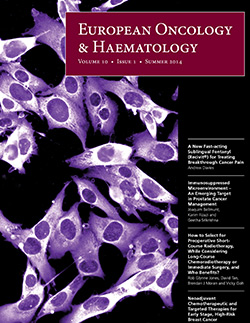EUROPEAN ONCOLOGY & HAEMATOLOGY – VOLUME 10 ISSUE 1 – SUMMER 2014
Welcome to the summer edition of European Oncology & Haematology. This edition features concise review articles spanning a range of hot topics in the oncology world. Editorial Board member Bernardo Rapoport introduces the edition with an interesting editorial on chemotherapy-induced nausea and vomiting, and the need for more effective therapies in supportive cancer care.
Andrew Davies reviews new fast-acting fentanyl in the treatment of breakthrough cancer pain and Joaquim Bellmunt et al discuss the immunosuppressed microenvironment as an emerging target in prostate cancer management. In the Breast Cancer section, Clement Chung et al review neoadjuvant chemotherapeutic and targeted therapies for patients with early stage, high-risk breast cancer and Cicero Urban et al discuss oncoplasty as the standard of care in breast cancer surgery. Further knowledgeable articles in the areas of melanoma, breast cancer and gastrointestinal oncology are also included, along with two interesting case reports.
Please peruse and enjoy the broad range of other articles featured in this edition, we hope they will provide expert insights relevant to your practice and interests.







